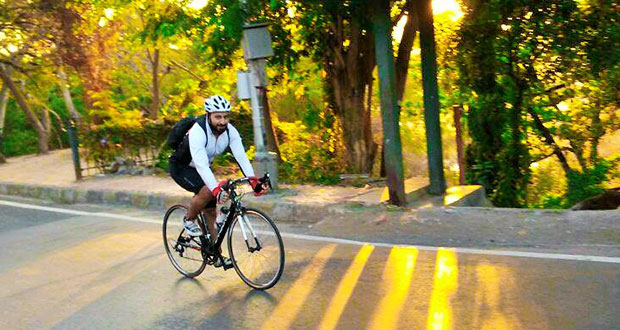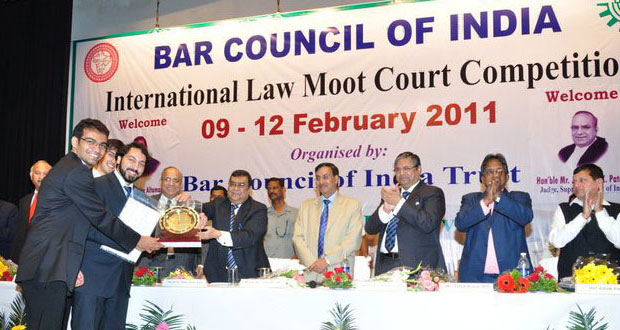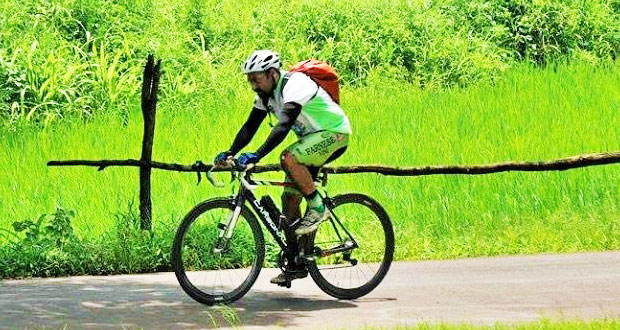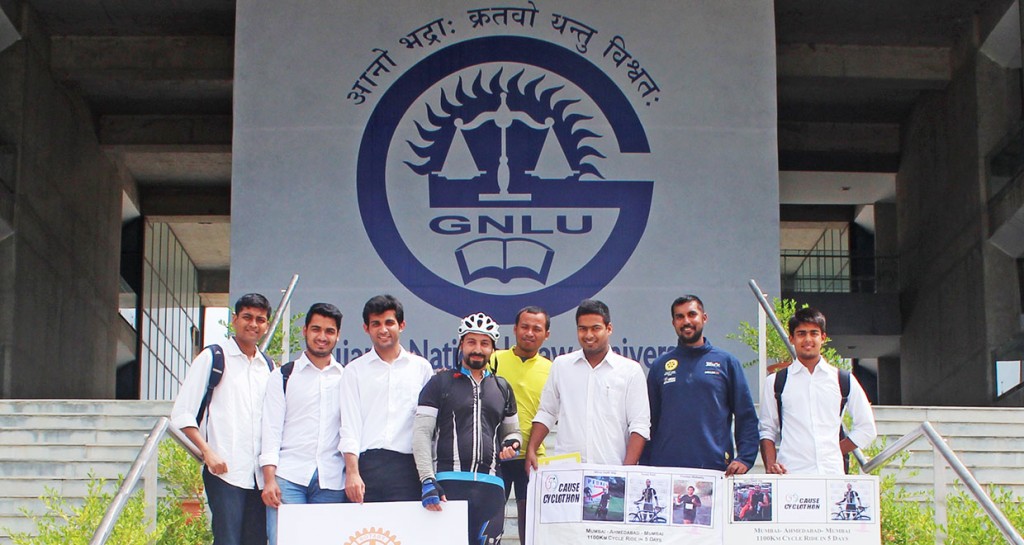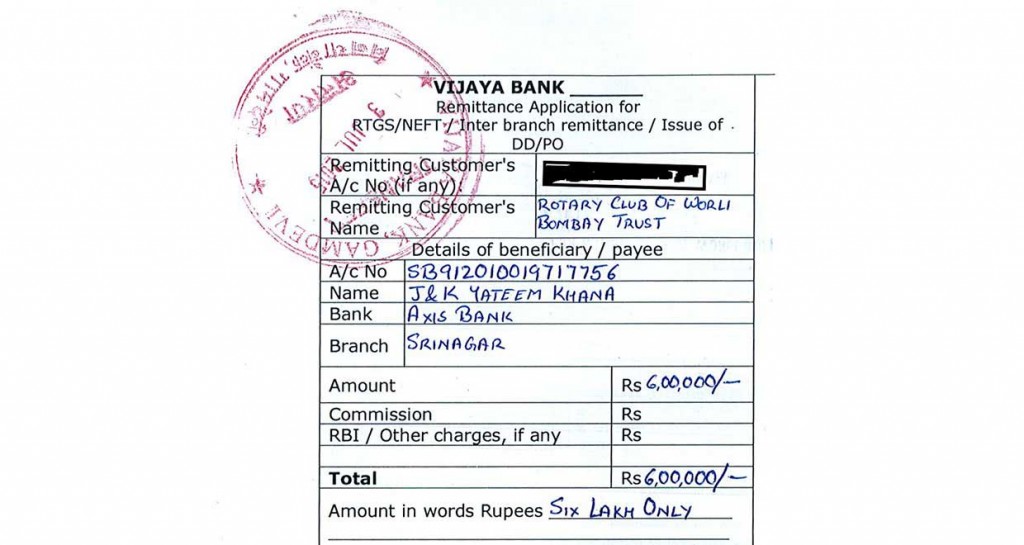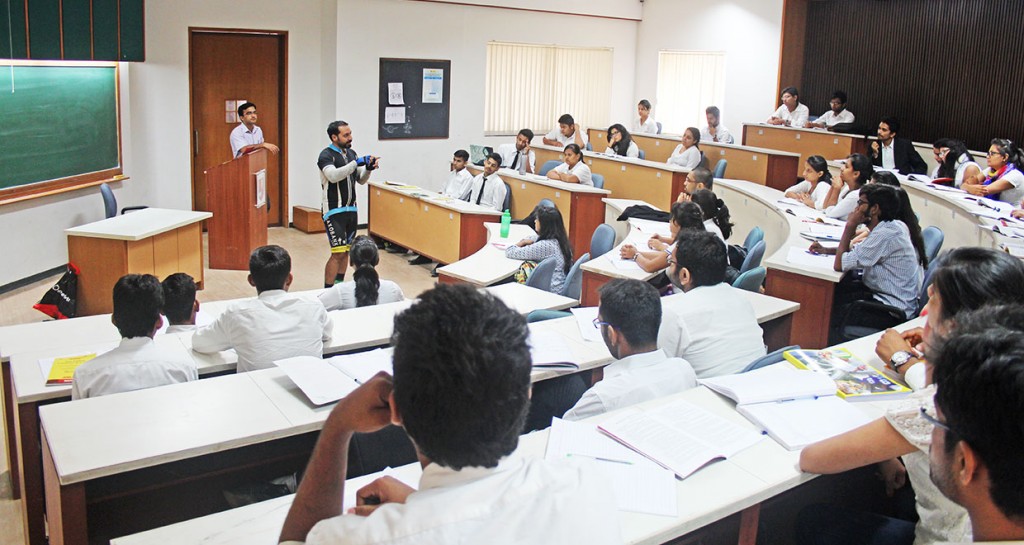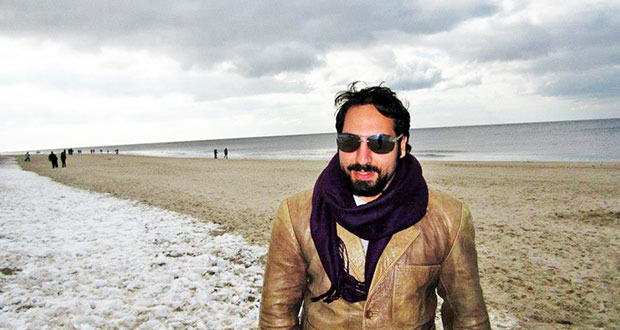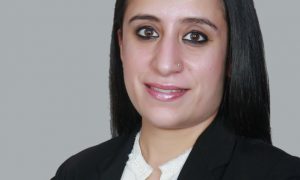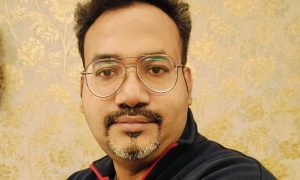Mirza Saaib Beg graduated from NALSAR University of Law, Hyderabad in 2013. He has been a teaching assistant and guest lecturer as well as worked under the guidance of several permanent judges of the Jammu and Kashmir High Court and has contributed to legislation and policy development. He currently works with the Legal Affairs Department of SEBI. He also undertakes the Cause Cyclothon in order to raise funds to assist the pursuit of education.
In this interview, he talks to us about-:
- The influences and the background that prompted the pursuit of law and the experience of a law school life including internships, moots and learning experiences.
- The nature of work at the Legal Affairs Department at SEBI.
- The idea, journey and vision for Cause Cyclothon.
What drove you to choosing law as a career? Would you say that your choice of Law as a profession was influenced by any particular incident in your life?
‘Why law?’ seems to be a question that comes up more often in our line of work as opposed to other professions. It is almost as if people are surprised that you being a seemingly healthy and sensible individual would consent to subjecting yourself to this predicament (laughs).Arriving at your true calling in life is an intricate process of personal discovery and there are many factors that lead to my decision but there is one factor that I can narrow down as an important catalyst-Due to the increasing turmoil, I was forced to leave my home, Kashmir, when militancy erupted in the early 1990s because the sheer scale of violence made Kashmir too vulnerable. What followed in the years to come in Kashmir was far too difficult to endure as a people and as a society, and the cicatrices left are not going away anytime soon. In pursuit of a stable education, most of my initial life, I had to live away from my parents and my home, but I am glad that my family always instilled in me a deep sense of ‘belonging to my homeland’. My father, whenever we met, ensured that I learnt the Kashmiri language, by entertaining me with Kashmiri folk tales replete with polite Kashmiri expletives, much to the chagrin of my mother. About a decade later, when the situation back home improved relatively, I resumed studies in Kashmir and spent my formative years there.
It was only then that I could comprehend how decades of political turmoil had caused a mutation in the minds of people. There was an almost irreparable erosion of the legitimacy of rule of law and it felt as if the basic building blocks of a peaceful, modern and conscientious society had been thoroughly ransacked. This experience deeply affected me and over time I came to realise that I would not be satisfied with my professional existence unless it had some relevance to economic and legal development in Kashmir, either by way of financial assistance from my side or by directly getting involved in economic legislation and social policy issues to further the interests of the place. It is in this backdrop that the choice of law as a career was a well-considered decision.
Kashmir was, and continues to be, in need of a catharsis on many fronts and I decided to study law with the objective of eventually using my education and resources to play a role in this inevitable purgative exercise. To my mind, a training in law was most appropriate to prepare me for the challenges that lay ahead –a fear of uncertainties, the hope of order, triumph and a constant process of discovery of ways to mend the economic and socio-legal fabric of Kashmir’s society- all this had left me in deep thrall and I decided that I would have the best of tools to address the challenge. Over the years, having met many Kashmiris living away from home due to the economic and political situation there, I have observed that the desire to do ‘something’ for Kashmir is a feeling that is not alien to any Kashmiri and it is a point of poignant meditation that we are all connected by our pain.
How was life at NALSAR, one of the premier universities of the country? How significant was your alma mater’s role in influencing a change in your personality, if any?
Any answer that I can give about life at Nalsar bespeaks immense pride but I make this declaration to ensure that my casual sarcasm isn’t misunderstood to be criticism. When I came to know that I had made it to Nalsar, I was quite excited and in a moment of naiveté I toured the empty university campus, a full month before classes were scheduled to begin and it all looked so timeless, eclectic and enduring that I felt a majestic fulfilment at the realisation that I would soon be allied with this ennobled place. While all these feelings most definitely stemmed from, and were exaggerated by, the aforementioned naiveté but even till my last day at Nalsar I never had any qualms about being on campus when it was empty. In fact, I often looked forward to it.
Before joining a premier law school, most law students are mistakenly lead to believe that life there is something on the lines of the movie and/or book ‘The Paper Chase’. If you have reposed your faith in the hands of a movie then it serves you right to be crippled with fear at the prospect of joining a place that is fuelled by insanity and cut-throat competition. To be conscious that you are ignorant is a great step to knowledge and a good law school comes fully equipped with good seniors and teachers who will be relentless in their attempts to instil this knowledge in you, through ‘intro-moots’ or ‘positive interaction’ as well as some help from Socrates and his many methods. So, if you enjoy the prospect of spending half a decade mired amidst polemics, paranoia and intense competition, then a top tier law school is the place for you (laughs).
All sarcasm aside, half a decade at Nalsar has had an extraordinary impact on my growth and enrichment and I am glad to be among the inheritors of its traditions. My batch was an intellectual melee of sorts and there has rarely been a moment when I was not positively intoxicated by the kind of depth and insight that this group could display. No matter what yardstick or criteria were employed, this bunch of phenomenally talented people had been jumping hurdles all their lives, impressing all around them, leading, succeeding, achieving and here they were for me to learn from them for half a decade of my life. We all learnt so much from each other, and collectively enjoyed so many common bitter and sweet memories, that sometimes I wonder whether the perceptions of life that we fashioned over that half decade were just a patchwork of thoughts that we all borrowed from one another.
You have an extensive mooting record, both nationally and internationally. How do you feel that our readers can become better mooters?
(Saaib was the winner and best speaker at the Bar Council of India Moot and also emerged as winner and best speaker at R. U. Singh Memorial National Moot in addition to participating with great success in IICLAM, Surana & Surana Trial Advocacy, and the Frankfurt Investment Arbitration moot. He was also the recipient of Bar Council of India Trust Scholarship.)
If you want to be a good mooter, then you must appreciate that mooting is not just about theatrics and paroxysms but it is about identifying an argument that is viable and practicable in the real world, in addition to being sound in law. You also need to have a brilliant level of understanding with your team because the intense pressure and competition will take its toll on all of you. It is ironic that I remember my mooting experience with such fondness despite the utter chaos that always surrounded them. I attribute this fondness to all those wonderful people who were my team mates at different points of time. The Bar Council of India moot has always been a difficult moot to tackle due to the changing format of the problem and the expanse of law that one has to get acquainted with before the problem is even released. My team comprised of Vishwajith Sadanadna and Shrishail Navalgund, who are currently practicing in Delhi and Bangalore respectively. Our team won the moot and I was awarded the best speaker, but both of these achievements couldn’t have been possible without timely contribution and patience on the part of my team. We began our preparation for the moot about 7 months before the problem released, and we researched on various areas of law that we anticipated could be connected to the problem. One area of law that we had left out was arbitration law, since the moot had never been an arbitration moot. However when the problem was released, it was based on a challenge to a foreign arbitral award. So it wasn’t quite an arbitration moot but it concerned arbitration law and we were hard pressed for time as we had to study an entire area of law that we had not dealt with much. Working on this moot was immensely enriching as we ended up studying thoroughly on at least 10 different areas of law and this broad base of knowledge in areas that was seemingly unconnected at first, helped in giving us a better perspective on how to frame our arguments. As best speaker, the scholarship was awarded to me by the Bar Council of India Trust as a monthly stipend for one year. In order to become better mooters, you definitely need an almost indefatigable resilience but also some level of institutional support as a lot of our work is subject to the quality of research materials that are made available to us, especially in the case of international moots. But at the end of the day, students really need to enjoy the whole mooting process and all the chaos that comes with it. I know this is easier said in hindsight.
How would you suggest students to involve themselves in taking more part in research-oriented activities? Share with us your experience as a teaching assistant at Nalsar, guest lecturer at different universities and your work with Lexis Nexis Butterworths Wadhwa.
As a law student, it is imperative and almost indispensable to undertake extracurricular activities that hone your legal skills because there is only so much that you can learn in the classroom. You really need to immerse yourself in the real world and pick current topics to analyse them from a legal perspective, assess the challenges you face in implementing legal and pragmatic solutions and engage in research work beyond your usual college projects- it is a great way of motivating yourself as well as improving your legal skills. I have always felt that for any lasting stability and development in Kashmir there is a need to strengthen economic legislation as well as address the address the political aspirations of the electorate. These two issues are not mutually exclusive. So, in addition to my usual college research work, while interning under various permanent judges of the High Court at Jammu & Kashmir, I would take out time to visit universities and colleges and law schools in Kashmir to talk to students about various socio-political issues of importance to Kashmir and on other areas of law and economic development that can help an emerging and developing market like Kashmir. Some of the lectures and discussions are mentioned herein-
I delivered a guest lecture to the students of 4th year, BA LLB at the University of Kashmir, Department of Law on the topic “Demutualisation, Corporatisation and the Voluntary Exit of Exchanges in India.” The lecture revolved around the issue that nearly every stock exchange in India has voluntarily exited the business and whether it is viable for Kashmir to invest in creating a stock exchange market for itself to cater to investments through the capital market. Since the students were in their penultimate year of law school, it was a healthy exchange of ideas that we could employ to assess this policy issue.
I engaged in a discussion on the topic “Realizing the Summit of the Potential of the ICC: Legal Challenges and Opposition” with the students of 6th Semester BA LLB at the Central University of Kashmir, Department of Law on 9th June 2011. Earlier in 2010, Kashmir saw massive protests over the killing of a teenager named Tufail Ahmed Mattu who, at the time of his death was playing cricket in Gani Memorial Stadium, Srinagar. During the protests, according to official figures around 110 civilians lost their lives and around 1,200 CRPF men and 2,700 police personnel were injured. Over the course of the discussion we wanted to examine whether an international body could play a role in the smouldering cauldron that had been created here, the legal challenges thereof and the opposition to such policy proposals.
When I was interning with the then Advocate General of Jammu & Kashmir, Mr. Ishaaq Qadri, stationed at Jammu during the winter, I visited K.C Law College, Jammu to interact with the students there. Under the guidance of the dean of law, I delivered a guest lecture on the topic “Legal Policy and Legislation for J & K” to the students of 1st year B.A., LL.B. (Hons.).
Under the guidance of Dr. Sheikh Showkat Hussain, I delivered a guest lecture on the topic “Self Determination in International Law” to the students of 3-year course LLB 2nd semester at the Central University of Kashmir, Department of Law. Dr. Sheikh Showkat Hussain is a political analyst and a prominent scholar of human rights and international law. He has authored several books on the Kashmir conflict and I have been fortunate enough to have a guide like him in my student life and beyond. It has also been propitious to have a teacher like Prof. (Dr) Faizan Mustafa, vice Chancellor of Nalsar, who facilitated and put in place the Teaching Assistants programme at Nalsar. He encouraged me to be engaged as a Teaching Assistant for International Relations- Political Science and Law and I’ve had the opportunity of learning a lot from him during my time in law school and continue to learn from him even today.
As regards Lexis Nexis Butterworths Wadhwa, when I was in college, some of my batch mates and I were engaged in editing work for Mr. Anirudh Wadhwa. The experience was quite educational as we were assisting in the editing of books that we were studying ourselves and one of the most prominent tasks we were assigned was to assist in editing Mulla, Contract Law by Sir Dinshah Fardunji Mulla (13th Edition, ISBN number: 978-81-8038-673-2).
Tell us about your experience in Student politics. How has this helped you grow as an individual?
(Saaib was President of NALSAR Student Bar Council from 2012 till 2013 and General Secretary from 2011 till 2012 and received the Vice Chancellor’s Gold Medal for Best Male Graduate with Proven Leadership Qualities.)
Student politics will take you down a road which is a seething cauldron of ever-calculating and self-evaluating moments replete with predictions, anxieties and judgment (laughs). The night just before elections used to be the liveliest and most electrifying night on campus, and in hindsight I can confirm that the world of student politics is deliciously Machiavellian and is not for the faint hearted (insert politically appropriate smiley face here). It is vicious precisely because the stakes are so small and contrary to the assumption of most student leaders, it is not necessarily a route to Downing Street. I’ve read and observed that, to lead is a noble thing, and the greasy pole of student politics will definitely prepare you for challenges of life, and you will emerge not only unbroken but more ‘whole’. But there are certain things I’d like to see changed in law school student politics. There are over 1000 law schools in India and it’s a pity that only a handful of them have a real student government elected by the students and with their own financial budget.
Even in colleges where there is some semblance of a student government, the government is limited in its potential since most of their time is lost in bargaining on basic issues like securing permissions and facilitating events that have limited impact on their immediate vicinity, and much less on law-students in general. There is precious little room for student government to assume its real role as a truly representative student voice and/or think tank of the student perception and pursue policy engagement at a larger level. Most universities abroad have recognised this immense potential and are nurturing groups like Cambridge’s Wilberforce Society which recently worked for the Tunisian National Assembly on their new constitution among other issues. In some National Law schools, we have similar discussion forums and groups but these are not necessarily formed by their respective student governments and this is where I feel student politics is lagging.
If harnessed appropriately, student politics has the potential to produce champions who can fortify society, individually and collectively as their political thought grows with their electorate in the microcosm of society that is their university. It is this fortification of society that is severely lacking in places like Kashmir where ‘low grade rationalism’ dominates the current political approach that elected MLAs and MPs have toward the electorate. This mediocrity in leadership that we face today can only be cured by a proper training in statesmanship, and student government in its appropriate form can be a great stepping stone towards such training.
In its current state, student government in Indian law schools, at best, produces functionaries who tread party lines and not leaders, much less statesmen. There is a perceptible miasma of distrust and this abyss between the common people and the government is loaded to widen. On the brighter side though, even at the grass-root level, Kashmiris are realising that there is no way out but to pull themselves up by their own bootstraps as decades of electing people who are too grievous to govern has not yielded desirable results.
Your yearning to contribute to legal policy issues surrounding grass-root democracy and economic development in Kashmir is inspiring. Please tell us more about this.
(As a law student in his 4th year, while studying Election Law, Mirza Saaib Beg interned under the Minister for Rural Development, Panchayati Raj, Law, Justice & Parliamentary Affairs)
In 1688 the Swiss doctor Johannes Hofer published a tract in which he endeavoured to describe the pain resulting from the yearning and inability to return to one’s home. I am unable to actively work in Kashmir at the moment as I feel that I can serve the economic and legislative interests more effectively when I am better equipped and every day is a step closer to this objective. Kashmir, evokes the fiercest elements of ‘yearning’ in my being but mere nostalgia, devoid of any action, is an emotion which is politically reprehensible and empirically untenable. I feel that it is imperative for educated Kashmiris to exploit their education to push the Kashmiri society towards being emancipatory and progressive, whereas the ‘empty yearning’, devoid of effective action, may rightly be condemned as an irrational obstacle. So I do my part in ensuring that my society is ushered away from an anachronistic state of being by contributing through my education and resources.
After a semester studying Election Law, I was required to intern with an institution to apply my learnings. Instead of pursuing an internship away from home, I decided to employ my education to study and better understand Election Law in Kashmir and I approached the office of the Minister for Rural Development, Panchayati Raj, Law, Justice & Parliamentary Affairs to contribute. It is my understanding that for a representational democracy, free political expression is essential. In Kashmir, political groups and messages that resonate with the popular sentiment are criminalised and therefore elections do not necessarily result in a representation of the popular sentiment. In the past electoral candidates, who had a differing ideology, or who did not meet the approval of influential Indian politicians were summarily rejected by disqualification of their nomination papers and even rigging in elections. In this internship, I prepared a report on Panchayat elections from around the country where I analyzed various issues that could come to the fore with such panchayat elections. The internship report was submitted to Mr. Ali M. Sagar, Minister for Rural Development and Panchayats, Law, Justice and Parliamentary Affairs wherein I assessed a host of economic and policy based issues including:
- Measures to diminish powers of State Governments to delay Panchayat elections. Usually elections are delayed on purely political considerations to gain outcomes favourable to New Delhi.
- Economic legislation for measures to decrease the State Election Commission’s dependency upon the State Government for logistic support and finances. The State Election Commission needs to be an independent body, which is not controlled by any Indian or Kashmiri political group.
- Delimitation of constituencies (Powers of using delimitation to control electoral outcomes must be repealed).
- Economic legislation to tackle lack of accountability of Panchayats- There is no time frame to conduct the audit of accounts of a given year and/ or submit the audit report.
- Lastly, I made a case for strengthening the State Election Commission (SEC) by making specific provisions in the Constitution of Jammu and Kashmir. In its current form, the State Election Commission is not an independent body and therefore the elections conducted by them are also questionable. In the past the SEC has been abused to reject nominations of candidates who are not approved by influential Indian politicians. For a truly democratic process, all institutions of governance such as courts, police and overseeing commissions must be free from any influence.
Given your background in student politics, how did you feel about your role in contributing to such legislation, policy-making and economic development and what were your perceptions about grass-root democracy in Kashmir?
My experience in student politics has shaped my perception that the Kashmiri electorate has started to dabble its hand at chivvying Kashmiri leaders into developing a sense of perspicacity but unless our leaders overcome the inability to think beyond the next election, we will continuously be faced with a situation where people will get disgusted with traditional politics, something that can be observed elsewhere in India as well as in other countries today. Representatives time and again fall prey to compartmentalizing their electorate into watertight compartments relegated to be pacified by the appropriate sound-bytes. Far from being emblematic, there is much to be desired for grass-root democracy, in Kashmir. However, I have courage over my conviction that with the appropriate training, the growth of young, educated and conscientious leaders will see us in good stead to face the challenges of political instability and economic development. Addressing the issues in Kashmir requires more than mere passion for Kashmir because the issues are so complex that effective solutions require extraordinary prescience, profound thought and perception as well. Kashmir is undergoing an insurrection of the mind as we face a growing wave of violence. As educated, conscientious people it is imperative to ensure that we choose leaders who possess the enduring insight to steer us away from these waves that are fed with politically immature and often violent rhetoric. Further, as educated and conscientious people we also have to understand that war and conflict is not something that only governments inflict upon one another but it is also implicit in the seemingly innocuous decisions we take daily at an individual level which lead to macro-differences between communities. Kashmir cannot afford to be a fractured society and every effort must be made, at an individual as well state level, to ensure that our leaders are fully aware of the subtleties and complexities of the interplay of religious factors, geopolitics, and the corrupting influence of desire for power that is the overarching theme of Kashmir’s long history of conflict. During the time of the panchayat elections, every news channel in India categorised them as ‘historic’-The panchayati raj elections in Kashmir can quite possibly be termed as ‘historic’ but unless we as educated and conscientious people take social and political action to address the complexities mentioned herein, the sound-bytes will continue ad-nauseam without any effective results. In the opening lines to “The Eighteenth Brumaire,” Marx famously amends Hegel’s statement that historical events happen twice, by adding that they occur first as tragedy, then as farce. I feel these lines are quite apt for Kashmir. Unless educated and determined people act immediately, the repetitive dialogue surrounding Kashmir will be nothing short of farcical and the deadlock on diplomacy, political and economic development will be stuck on a never-ending loop which is detrimental most of all to the state-subject.
As a law student you made some documentaries on issues that interested you. Please tell us about this work. Was it a part of an internship?
No, this was not a part of any internship. I wanted to explore certain themes through a medium that was convenient for anyone interested in the work. The documentaries were made in my second year of law school with an intention to understand what the electorate in remote areas of Kashmir felt about the social and economic laws that they are governed by. The research topics covered issues like justice and juveniles, poverty and deprivation, political turmoil and children, Islamic finance etc. Making these documentaries in pursuit of a systematic ethnography served as an alternate educational platform for me. My education at Nalsar fuelled my rationality when I approached these sensitive topics. The experience taught me that there are no simplistic solutions to problems of legislation in Kashmir. At first, the complexity of legislative problems in Kashmir frustrated me because I was unable to dismantle the legal problems with my crude screwdriver and I lacked the expertise and/ or resources to wield better tools. I figured that I needed a more refined toolbox and I went back to law school with new-found resolve to use my subsequent education to tackle the complexities of social and economic legislation. I would come to Kashmir during every break to work with various academicians, politicians and within the legal fraternity to hone my understanding of these issues.
What other kind of internships did you undertake?
Among other miscellaneous internships, I also interned with law firms like Amarchand, Luthra, AZB, and also with Jammu & Kashmir Bank Financial Services Ltd., ICICI Bank, Ministry of Social Justice and Empowerment and under a few Senior Advocates, including the Advocate General of Jammu & Kashmir.
How did you decide to seek employment with SEBI? How did your appointment at SEBI take place? Please share with us an experience from your initial days.
Over the course of my education I arrived at the conclusion that many issues in Kashmir could be resolved through economic legislations as well as addressing the political aspirations of the electorate. I feel that these two are not mutually exclusive and that Kashmir is being lead into an economically regressive tract leading to a domino effect on many other frontiers. I decided to work with SEBI as this was the only institution where I could get quasi- legislative, quasi- judicial as well as quasi- executive experience which I felt was essential for my objective of working on economic legislation and contributing to development. At that time I had also heard that SEBI was considering setting up an office in Kashmir and I felt that this would be a great opportunity to contribute to and observe economic legislation as well as gain quasi-judicial experience. The process of appointment was based on an initial shortlisting and subsequent interview process. SEBI shortlisted the ten best ranked CVs from the applicants and conducted an exhaustive interview which covered recent developments in the capital market in addition to various concepts of securities law, eventually selecting two candidates from all the applicants. After joining SEBI, I observed that while regulating and developing the capital market and protecting the economic interest of investors are the primary responsibilities, the organisation is quite proud of its social consciousness as well. Soon after the devastating flood in Kashmir last year, I approached the Chief General Manager of the HR department and evinced my desire to get involved in the relief effort. Without any hesitation, he mobilised the process and within a few days, in a very touching gesture, Rs. 9.10 Lakh were contributed by all employees from their monthly salaries and transferred for the relief effort. At that moment it felt that I had taken a small step closer to my personal objective of being in a position to contribute towards the betterment of Kashmir, and it was a truly wonderful feeling. I look forward with eagerness to the time when I can take bigger steps on this path.
What are your primary responsibilities in SEBI’s Legal Affairs Department? What all does the work profile in SEBI’s Legal Affairs Department consist of?
I am employed with the Legal Affairs Department at SEBI which is responsible for providing legal counsel to the SEBI Board and to its other departments, and to handle non-enforcement litigation. The department has a division of policy and divisions of regulatory assistance. The work of the Legal Affairs department includes formulating SEBI’s legislative initiatives, various categories of SEBI pronouncements (i.e., regulations, guidelines, circulars, instructions, etc.), the hierarchy of their force and effect, the procedure for their promulgation, amendment or repeal, reviewing and commenting upon proposed regulations that would affect the securities industry, SEBI’s authority or operation. The division is engaged in providing legal advice to the Market Regulation Department (MRD), Corporation Finance Department (CFD), Investment Management Department (IMD) among others. MRD is responsible for supervising the functioning and operations of securities exchanges, their subsidiaries, and market institutions such as clearing and settlement organizations and Depositories. CFD deals with matters relating to (i) Issuance and listing of securities, including initial and continuous listing requirements (ii) corporate governance and accounting/auditing standards (iii) corporate restructuring through Takeovers / buy backs (iv) Delisting etc. IMD is responsible for registering and regulating mutual funds, venture capital funds, foreign venture capital investors, collective investment schemes, including plantation schemes, foreign institutional investors, portfolio managers and custodians. So the portfolio is quite expansive and the experience gained thereof is holistic in terms of exposure to litigation in SAT, the Bombay High Court and the Supreme Court of India, policy-making and drafting of the regulations and it is a great vantage point to learn about the effect of legal policy on the capital markets.
You cycle over 50km-60km every day in Mumbai. How did you take to cycling? Was there anyone or any event that inspired or motivated you to take up this as a daily activity?
I took to cycling because it represented a truly emancipating activity which was immersed in a real world environment. In my fourth year at Nalsar, I was elected as General Secretary of the Student Union at Nalsar. At that time, I used to cycle around NALSAR with some of my batch mates and we had toyed with the idea of a cycle trip to all national law schools as a symbolic gesture to ‘connect’ the student governments at each place to deliberate over an issue of national and legal importance concerning Kashmir. Even when I used to intern in Bombay with law firms, as a student, I would lament the deplorable condition of traffic and I even considered the idea of cycling to work. However, due to various reasons, these plans could not mature at that time.
I thoroughly enjoyed cycling and I was looking for a way to merge my desire to make a perceptible difference in Kashmir with my love for cycling. When I moved to Mumbai to pursue my employment with SEBI, I read about two investment bankers and a doctor who had raised over Rs 13 lakh for St. Jude India Childcare Centre, an NGO that aids parents of children with cancer by cycling 250km from Mumbai to Pune and back. I decided to train myself to be in a position to cycle at least 1000km and raise enough funds to provide 20- 30 orphaned, meritorious students, in Kashmir, with a basic education. I started cycling 10km, once a week, and gradually I increased my duration and distance to about 50 km every day. During the weekends, I meet with interested people from all over the city and cycle between 100-300 km to Lonavala, Nashik, Pune, Bharuch, Alibaug etc. I started meeting people with diverse backgrounds- musicians, actors, stand-up comedians, artists and curators in addition to people from conventional professions. On the long cycling trips, my mind is free from distraction of my smartphone and the engrossing condiments that accompany it. I have realized that our lives are so heavily “comoditised” that we forget the difference between making a living and having a life and we ignore the nourishment that such idleness can provide to our thought process. For me, this experience has definitely been enriching from a psychological and even sociological perspective. Needless to say, physiologically I feel younger today than I felt when I moved to the city and that is not something you often hear from people who work a full time job in the legal profession (laughs).
How does it feel to cycle to work daily? What is the experience like? Is it difficult for someone to emulate this and promote cycling in India?
I figured that the only way I could make time for my training was if I incorporated it as a part of my daily routine. So I decided to cycle to work and effectively pursue my training while I commute to work. My office, SEBI, has an in-house magazine called ‘The Insider’ and when I started cycling to work, they asked me to share my experience with them. I told them that contrary to popular perception, it is actually surprising that in Mumbai very few people cycle for leisure and even lesser people cycle to work. I say this because Mumbai is a relatively flat, linear city and the weather is forgiving for 8 months a year, unlike most cycle-friendly cities of the world- London is too wet, Copenhagen is too cold and Amsterdam has terrible headwinds that make cycling quite onerous.
In 2014, these cities were rated as some of the best in the world for cycling according to “Copenhagenize Index” which is a list of the world’s most bike-friendly cities. Not only is cycling the best solution to Mumbai’s woeful traffic, but making the roads cycle friendly is not even a heavy burden on the state’s budget. For a fraction of the Rs. 160 crore (£160m/ 16 billion rupees) cost of the eight-lane Bandra-Worli Sea Link toll bridge, the state government could have transformed cycling and public transport in the city. To comprehend how little we need to become a cycle-friendly city, contrast this Rs. 160 crore with the fact that in UK average annual government expenditure on cycling in the UK was £1 per person (Rs. 100) for the entire country. Incidentally £1 is considered to be quite low by most European standards where the annual government expenditure on cycling is about €25 per person (Rs. 1800). Studies show that every kilometer cycled in Denmark earns the country €0.23 (Rs. 17). For me cycling never started off as a way to burn calories or save petrol- it simply was a “fast form of pedestrianism,” and the most exciting way to get around. Every resident of Mumbai knows what it feels like when you have to drive your car in stop-and-go traffic to get to work every morning. Every resident of Mumbai dreads the commute to work and back home. Imagine if your vehicle didn’t have to stop-and-go intermittently like that. Imagine making your commute an exciting highlight of your day. And imagine starting every day feeling perfect, alive and look forward to your commute to office. That is what cycling to work feels like. Having said that, it is a relief to have a shower and gym facility in office which makes things very convenient, as I carry my formal clothes in a backpack to change into after cycling, without which it would have become an onerous activity.
Indian cities and interested cyclists don’t need to reinvent the wheel to promote cycling in the metro-cities, they just need to copy what the cities that did make the Copenhagenize top 20 are doing such as encouraging employers to install a shower facility and cycle parking in office, sensitizing car drivers towards cyclists and sharing the road and lowering taxes on import of cycles. Once cycling is presented as a convenient way to get around, which not only profits by way of financial saving but also health benefits, the masses will take to the cycle. Cycling is most definitely a part of the future and the sooner our governments realize that, the better it will be for all of us.
Tell us about the Charity Ride Cause Cyclothon and your cycle ride to Ahmedabad from Mumbai. How did this idea strike you?
After the floods in Kashmir in 2014, everyone was outraged by the sheer unpreparedness of the government to meet the challenge of a calamity that was not unforeseeable, and had in fact been widely speculated about. While collective outrage is easy to find, it is not easy to channelize that outrage into proactive and positive action as this takes time, effort, money and other resources. Luckily, I’ve found some individuals who are willing to give most, if not all, of these requirements. Undertaking this journey gives me the satisfaction of having tried to make a perceptible and positive difference to a severely dilapidated place that I call home. I plan to connect law schools on my journey and show interested people how they can contribute to making a difference to the lives of orphaned children, without necessarily making a financial contribution.
Cause Cyclothon is an event aimed at raising funds to assist the pursuit of education. We cycle long distances of 1000-3000km to raise funds and help anyone financially to pursue their education. We completed the FIRST PHASE last month where we cycled a total of 1268 km from Mumbai to Ahmedabad and back in 5 days visiting all prominent law schools en route and we raised Rs. 10 Lakh for an orphanage in Kashmir, Rahat Manzil which operates under the aegis of Jammu & Kashmir Yateem Khana. I was accompanied by two amazing cyclists and wonderful human beings- Pranaya Mohanty and Sumit Patil and we were cheered on and supported by over three hundred supporters, well-wishers and cyclists en-route in Surat, Vadodra, Bharuch, Ahmedabad and Anand. Pranayaregularly participates in endurance events like Brevets Randonneurs Mondiaux (BRM) events to cycle long distance rides of 300km, 400km and even 600km. He was the fastest Indian cyclist to complete 1200km Paris- Brest- Paris (PBP) cycling event this year (under 75 hours). Sumit has already completed the 601km Ultra Marathon Cycling Association world championship event in 30 hours and other events like BRMs, Desert 500 and Ultra BOB. He is currently training for the Race Across America. Both will be with me for our second ride also.
Cause Cyclothon is brought to fruition because of the encouragement and financial support given to us by the Rotary Club of Bombay Worli. They have been with us throughout the event from its inception to the execution. Last year they had run a campaign to support persons in need of artificial limbs and they continue to shoulder their civic and social responsibilities towards those less fortunate. We also have been supported by Killer Jeans and Ultra Tech Cement. All the money raised by our sponsors was sent directly to the orphanage. Rs. 6 Lakh were sent when we completed 600km of the first ride to correspond to Rs. 1000 for every km that we cycled. The event is also supported by “Team Agni”, and “To Kashmir” in addition to other supporters as mentioned on our webpage. Team Cause Cyclothon also engaged in pre-event campaigns for our ride- one month before we were scheduled to depart on our 1100km cycling journey, we had sponsored the “Smart Commute- Ride To Work” initiative which saw 450 cyclists in Mumbai converge at Sofitel hotel in BKC riding to office on their cycles. The event was presided over by the Maharashtra state minister for Environment, Mr. Ramdas Kadam.
If anyone is interested in helping the orphanage in Kashmir, or support us for the second ride, kindly get in touch with me over FB, gmail or phone so that I can guide you on what the orphanage and students need apart from financial support. Their account details are in the photo below:
Can you give us the highlights of your first ride and the plan for the second and third?
The plan was to cycle from NCPA, Nariman Point to Ahmedabad and back in 5 days (approx. 1200 km) and stop at every law university on the way to get students involved in the campaign. The idea was to raise at least Rs. 10 lakh in aid of educational initiatives at Srinagar’s largest orphanage, Rahat Manzil, which suffered over Rs. 40 lakh in damages during the flood in Kashmir last year.
You can see this page for snippets our first ride-
https://www.facebook.com/events/480284772147243/
You can view this video made by one of our sponsors which has clips of the orphanage trustees, children along with their appeal for the first ride that has now been successfully concluded-
https://www.facebook.com/saaib.mirza/videos/10207747075901909/
We stopped at every prominent law school on the route and did not solicit any financial contribution from the students we met but we only wanted to put forth the ground realities of what these children face, talk to them about our aims, objectives, motivations and get the students’ involvement in voluntary skype classes of 30 minutes per week or to assist in facilitation of sharing of reading material for the children. The response has been overwhelming and we are now planning the second phase to further our literacy campaign.
These were the universities and law colleges we passed by and stopped at for student interaction during RIDE No. 1-
- GLC Mumbai
- VT Chowksi Law College, Surat
- Sidharth Law College, Surat
- Law College, Bharuch
- Baroda School of Legal Studies, Faculty of Law, Maharaja Sayajirao University of Baroda, Vadodara
- Shree P.M.Patel College of Law & Human Rights, Anand
- Nirma University, AhmedabadGujarat National Law University, Gandhinagar, Ahmedabad
- GNLU, Gandhinagar, Ahmedabad
ABOUT THE SECOND RIDE:
The SECOND ride is nearly 3000km+ ride, over 12-14 days, from Mumbai to Kochi via Symbiosis and/or ILS- Pune, NALSAR- Telangana, NLSIU- Bengaluru, TNNLS- Tiruchirappalli and NUALS- Kochi. The list of universities is not exhaustive and we are still planning the final intended beneficiaries as we need to coordinate for time and semester schedules. We look forward to working with the students of each institution on this ride. (Tentatively January, 2016). We are also looking to expand the base beyond just law students and are planning to include IITs and IIMs en-route. The plan is to raise Rs. 30 lakh to sponsor the education of needful students in the universities that we stop at.
How will the students be shortlisted from each law school? How many students per college will you cover?
We intend to support the educational costs of at least 6-12 students per law school that we stop at but this is subject to the total that we are able to raise during the second ride. We intend to raise a total of Rs. 20-30 Lakh for this purpose. We are currently in the process of contacting vice chancellors, registrars, student-body presidents and concerned faculty at each prospective stopping point. We want the universities to give us a shortlist of names that require funding and an overview of their academic/ extracurricular performance. There is no particular standard that they must meet but we hope to fund the education of such students who have proven potential to better the environments that they came from and in turn help others who are faced with similar financial and social predicaments. The money raised will be given directly to the universities by our sponsors and will be used to cover the fees of the selected student’s academic year. Coming from Kashmir myself, I understand that when one is faced with any instability in the pursuit of education, it is very challenging for a student and it is imperative for us to remove such impediments to secure their future. We are grateful that our supporters and sponsors share our belief and are all ready to support us during the second ride as well.
Which major cities do you plan to cover? Are there any criteria for joining the cause, for example physical fitness, health conditions, et al?
The plan of Team Cause Cyclothon is to eventually cover every city which houses a major national university and support the literacy mission of Rotary Club of Bombay Worli and our supporters. We intend to provide financial support to anyone who needs the same and our supporters share this determination. The SECOND ride is nearly 3000km+ ride, over 12-14 days, from Mumbai to Kochi via Symbiosis and/or ILS- Pune, NALSAR- Telangana, NLSIU- Bengaluru, TMNLS- Tiruchirappalli and NUALS- Kochi. There is no hard and fast criteria to join us. For those who want to cycle a long distance (say above 300km) with us, it would be appreciated if they are trained long distance cyclists as such distances take a significant toll on the body and it is not recommended for a novice cyclist to undertake such a long ride without appropriate training. Our supporters can also join us for smaller distances (anything from 10km to 200km) as it would serve as a real boost and motivation for us during the ride. During our first 1100km Mumbai-Ahmedabad-Mumbai ride, we were joined by nearly 300 cyclists at various points who cycled 10km to 100km with us and cheered us on at Mumbai, Vapi, Bharuch, Anand, Ahmedabad, Surat and Vadodra. You may join the cause and support in any form and if you are not in apposition to contribute financially or not fit enough to cycle, then you can be a part of the cause just by sharing it on social media. That way, it might reach someone else who can assist us in making a perceptible difference to someone’s life.
Your event has generated a lot of attention on social media. A lot of stars and celebrities are also promoting your event on social media. How did you connect with them and the other people involved in the event?
The real celebrities are the people who supported us on social media and the cyclists who travelled 30-50km at 3am on the day of our journey, to ride with us and support us. Navi Mumbai cyclists, Mastermind Cycles, Bandra Cyclists Club, Mulund riders, Powai Pedals, Evo Bikes, RPM cycles, Xycolaire cyclists, CYC’d cyclists, Mumbai Cycling Enthusiasts, VeloCrush, Cyclop, Palm Beach Riders,Juhu and Lokhandwala Cyclists, Borivali Cyclists, BikeMe, and all the individual cyclists who supported us, rode for many kilometres, carrying food and refreshments for us- we feel they are our real superstars! Their gesture has touched us deeply and we are most thankful to them for their time and motivation. We have been very lucky in this regard and my fellow cyclist friends in Mumbai, Ahmedabad and Anand have been a source of great support. Their outpouring of emotional support on social media has made the event a success and we got in touch with various people to support us in any manner possible and Ira Dubey, Cyrus Brocha, Cyrus Sahukar and Kunal Vijaykar shot promotional videos with us to support the cause as these people have a large social media following. We are continuing with the social media campaign and hope to get more people involved who have a wider outreach to help us with creating awareness for the event. Of course, we are fortunate to have the financial and moral support provided by- Killer Jeans, Ultra Tech Cement, Rotary Club of Bombay Worli, Rotarians- Mr. Sandeep Shah, Partner N.A. Shah Associates, Mr. Ashish Meghani Managing Director Wrap Tech Machines, Mr. Kiran Vora, Mr.Quresh Karachiwala, Mr. Pankaj Tanna, Ms. Kavita Godbole and Mr. Jayanth Nairi- their support has set us free from the initial encumbrances so that we can pursue the promotion of the cause with the confidence that that they are with us, throughout the event and after, to help wherever we need their support. Our organising team had some great help from three young students- Armaan Bhatia student of St. Xavier’s, Siddhant Navalakha student of Jai Hind college and Varun Tanna from HR college whose timely assistance went a long way in making the first 1100km ride a success. I have no doubt that their efforts will ensure that the second ride is a success as well.
Do you intend for this to be a yearly event? Would you consider replicating this Cause Cyclothon for other regions in India?
As of now, we intend to undertake three rides in total to different parts of India and support educational initiatives en-route at various institutions. We have completed the first ride across the Western region and now preparing for our second ride which will cover central and Southern India. We have not finalised a destination or route for the final ride yet, but it would be nice to cover all the remaining portions in this vast and diverse country. If we continue to enjoy the support of our friends, families, fellow cyclists and the persons mentioned above who are generously sponsoring us, I see no difficulty in making this a yearly endeavour, or even multiple times a year.We plan to complete the third cycle ride by August 2016, possibly around August 14 and 15, the independence days of Pakistan and India respectively. If we are successful, I will dedicate the ride to independence in the subcontinent- independence from oppression, independence from tyranny and any turmoil, created by the hands of men, that deprives children from the ability to change their lives for the better. If not a financial contribution the least I hope to evoke from everyone is an introspective thought on how far the subcontinent has come in uplifting the weakest amongst us. Maybe that introspection will prompt them in playing a role, howsoever small, in making a perceptible and productive difference to someone’s life. I hope I’ll succeed in this endeavour.
What is the advice you would like to give our readers?
- There is a difference in being alone and being lonely. In law school, the boundaries between the two are often blurred but overcoming this central anxiety and paradox of life will train you to focus on identifying purpose and meaning in life. It will help you find that one thing in your life that is more important than you are, and then dedicate your life to it.
- As lawyers, we live in a culture of immediacy, where even our understating of the abstract is too ‘rationalised’, but when you’re pursuing something worthwhile, expect it to take some time and don’t get perturbed by the transitory stillness of life, rather cherish it for when the time comes for you to pursue your true goal, such still moments may be hard to come by. So run, go for aimless walks, cycle to nowhere in particular and don’t fear boredom. There is an evolutionary and creative purpose behind the aimless wandering and unconscious processing of thought. Give in to it every once in a while. Give yourself some “me-time”.
- And lastly, push yourself to participate in the creativity that an education in law has to offer, refuse to isolate yourself and learn to appreciate the bitter-sweet path of tenacity even if your counter-cultural bravery and constructive dissent are underrated.

